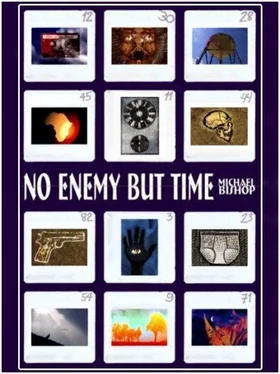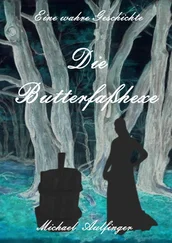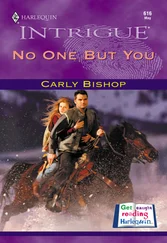“And another thing, Dr. Blair, Homo zarakalensis is a figment of your imagination, just as Richard Leakey says.” Joshua could see that the security guard who had been standing at the rear of the hall was now strolling down the aisle toward him. “ Zarakalensis is a habiline, just like the hominids discovered by Louis Leakey’s son at Koobi Fora in Kenya. You know this yourself, sir.”
The booing intensified, and the security guard, the same imposing black man who had eyed him earlier, took him by the arm. “That’s enough,” he said quietly. “I think you’ve had your say.” His grip a remorseless shackle, the guard led Joshua out of the auditorium to the goose-stepping cadence of hand clapping.
“Not only does the young man see into the past,” Blair called out to the audience, apparently attempting to quiet it again, “he also sees into the minds of ancient monuments like myself!”
Those were the last of Blair’s words that Joshua heard that night.
In a Season of Drought
Onemorning we awoke to find Alfie dismantling his hut, scattering the supports and thatching to the wind. Ham and Jomo, witnessing this activity, attempted to follow suit, but Alfie prevented them.
Although he was jealous of his own hut, he apparently wanted to leave a few dwellings intact as decoys.
These would give both predators and other house-hunting hominids pause, suggesting to foe and friend alike that the original builders might soon be back to occupy their dwellings. By this stratagem, Alfie seemed to imply, we would get a jump on at least some of our competitors.
It was time to follow the example of the tree mice, the zebras, the gazelles, the wildebeest, and all of Ngai’s other children. No rain had fallen here in at least four or five months, and only mongoose, hyraxes, naked mole rats, lizards, grasshoppers, and snakes were going to find this area of the veldt hospitable to their lifestyles. We had best bid New Helensburgh adieu.
We set out. I had not thought of returning to Lake Kiboko for weeks, but I had seriously considered going the whole hominid and shedding my remaining clothes. However, my bush shorts and chukkas still seemed indispensable. The pockets of the former accommodated many useful items and my scuffed boots had been on my feet so long that I had lost the calluses acquired during my survival training. Along with my shorts and shoes, I wore my.45 in its unornamented holster. My bush jacket was stretched taut across a makeshift travois, upon which I dragged my backpack, my bandolier, and a crude antelope-skin kaross of melons, tubers, nuts, and berries that Helen and I had gathered over the past several days. But because I did not want to renounce my entire past to achieve the disadvantaged innocence of our Pleistocene ancestors, I kept my pants on.
A carefully considered, but ultimately rash, decision.
We moved in good order, the men encircling the women and children. Despite her recent pair bonding with me, Helen continued to play a masculine role. Like Alfie, Jomo, and Fred, she brandished a hefty acacia stave. Malcolm, Roosevelt, and Ham carried lovingly polished antelope bones for clubs, while I, relying on my pistol and the others’ martial skills, pulled my travois as if I were a member of the women’s itinerant sorority.
Once, far out on the savannah, I turned and looked back at New Helensburgh. Despite the distance I saw a number of two-legged beings swarming over the hillside and along the battlement in front of our abandoned huts. I pointed out these figures to Helen. She cocked her head to one side and for a good half-minute studied their activity. No one else seemed interested, and we moved on. At regular intervals, though, I would glance back at the hillside. Eventually the tiny apparitions scurrying about there came down into the grasslands and completely disappeared from view. I had the distinct, unsettling feeling that the creatures were following us.
We reached the baobab in which we had installed Genly. Ham sang a long, plaintive note in remembrance, frightening several of the children, but we discovered no sign of either our dead comrade or the leopard that had devoured his remains. I worried that in response to Ham’s call the leopard would return, thinking that we had brought it another offering. The other Minids apparently shared this fear, for we did not shelter under the baobab but continued our southeasterly trek toward the mountain.
* * *
That evening, then, I found myself reciting in my head—with alterations dictated by circumstance—a poem I had first composed in Fort Walton Beach, Florida, after an especially vivid spirit-traveling episode. At the time I had been working during the day for Tom Hubbard’s Gulf Coast Coating, Inc., doing research on the Pleistocene at the public library in the evenings, and dreaming my singular dreams every fourth or fifth night. I was nineteen when I wrote the poem, and I never showed it to anyone, not even Big Gene Curtiss, my trailer mate.
Now, though, I decided to speak it aloud to the Minids, who sat or lay among the fig trees and acacias bordering the little gully where we had stopped. “This is called ‘For the Habilines Who Have Won My Heart,’” I told them, and I walked back and forth along the bank, declaiming my 2,000,007-year-old poem almost as if I were Alistair Patrick Blair putting on his Richard Burton act at an American Geographic fundraiser. In my own defense, though, I projected my very soul into the words, and the Minids listened to me with rapt self-extinction:
“Your mothers drop you in the dust of
unnamed basins.
Your sires rove like jackals on the
periphery of extinction.
How I came to be among you is
anybody’s guess.
Your sun is a gazelle’s heart held
throbbingly aloft.
You are learning how to pick apart
its ventricles.
Scavengers, you speak to me only of
your appetites.
Heedless, I ask you of Pangea and its
postmitotic progeny.
Laurasia and Gondwanaland are orphans
to your understanding.
The incontinence of Africa sculpts you
to its needs.
Language begins to sprout in the left
brains of the females.
The males poach dexterous insights
from the dead savannahs.
Birth remains a labor insusceptible
to practical division.
The tools you make resemble plectra
for uninvented lutes.
My pocketknife is a triumph no less
complex than television.
What percussive music rings above the
barren of our rivercourse.
My awe goes ghosting at our austere
communal feasts.
Together we break crayfish and suck the
slip of birds’ eggs.
Our most lovely artifact is a fragile
group compassion.
What you make of me is what the
millennia have made.
My sophistication is a fossil from the
future’s coldest stratum.
Am I the last anachronism of what you
move toward?”
Yes, a rapt and scary self-extinction. There was no applause when I finished, but no one had heckled or walked out on me, either, and when I sat down beside Helen to pass the coming night, she put her arm around my shoulders and huddled near.
* * *
Dawn elicited no reverent hymns from the lips of the habilines. Groggy, we puttered about trying to forage up breakfast and get our blood moving. We found grubs, a scorpion or two, some desiccated fruit, and a few tiny rock lobsters in the eroded banks of the rivercourse. Although I missed the singing, I knew that this morning we did not want to give away our position or proclaim this poor place our temporary capital. We were in transit, and our rootlessness had affected us all with a subtle sadness.
A holdover complication from yesterday still worried me. Behind us to the northeast, a mysterious band of two-legged creatures continued to dog our heels. Squinting into the sunrise, I could barely discern them moving through the thorn scrub, so like ghosts floating cool and transparent in the haze of mirage were they. Helen saw them too. As we marched she continually peered over her shoulder to catch a glimpse of the phantoms, but they had melted into the landscape and there was little hope of that. I soon ceased to fear the apparitions, but I never did get over the whispering nag of their presence. They were definitely there, and they were definitely following us.
Читать дальше



![Ally Carter - [Gallagher Girls 01] I'd Tell You I Love You But Then I'd Have to Kill You](/books/262179/ally-carter-gallagher-girls-01-i-d-tell-you-i-lo-thumb.webp)








